Dear Paul, Practice What You Preach: GSU-UE, The Kalven Report, and Unionization
The University’s opposition to unionization violates the principles of the school’s most prized document: The Kalven Report.
January 19, 2023
For years, graduate students at UChicago have tried to unionize, to secure a seat at the bargaining table, and for years, the University has torpedoed their attempts. On January 31 and February 1 of this year, however, eligible graduate students will vote on whether to unionize. We, The Maroon editorial board, fully support Graduate Students United – United Electrical Workers (GSU-UE) and condemn the University’s shameless attempts to curtail collective bargaining.
Graduate students across the nation are fighting for their right to unionize. And they’re winning. UChicago graduate students are an important part of this tidal wave of unions.
As the University administration has repeatedly stated in campus correspondence and interviews, UChicago is powered by graduate work. Many undergraduate classes are taught by graduate students—not professors. Outside of lecturing, graduate workers are our graders, teaching assistants (TAs), and tutors. Without graduate workers, UChicago, and higher education in general, would crumble. Yet, UChicago doesn’t pay their workers a living wage, provide dental or vision insurance, or listen seriously to concerns about equity. Instead, they broadcast platitudes about valuing graduate workers and budge only when the pressure becomes untenable (such was the case with the recent raising of the floor for graduate workers’ stipend) .
As it currently stands, the University has the power to do as it pleases with little consequence. They pad their endowment by exploiting graduate workers because there is no one who can check them. The power asymmetries between the University and graduate workers are stark and unacceptable. Unionization is a step towards closing that gap. Once officially a union, GSU-UE will be empowered by the National Labor Review Board (NLRB) to negotiate with the University. The University, much to its chagrin, will have to recognize GSU-UE.
Instead of listening to the calls for union recognition by their own students, the University has been disseminating anti-union rhetoric, shamelessly employing tactics used by notoriously exploitative employers such as Amazon and Starbucks. The history of anti-labor tactics, though, clarifies that the University’s focus on union dues, “direct engagement,” and the permanence of unions are straight out of the anti-union handbook. We find it self-evident that this behavior is unacceptable; however, we also argue that this behavior runs counter to the University’s own values.
The University, Unionization, and the Kalven Report
The core of the University of Chicago’s identity is its commitment to free inquiry—a core so sacred that the University launched a new center for Freedom of Speech just this week. This purported commitment, though, goes back decades.
In 1967—under the order of then-president George W. Beadle—a special committee released the Kalven Report, now “one of the most important policy documents” directing the role of the University in social and political action. The committee found that universities “cannot insist that all of its members favor a given view of social policy; if it takes collective action, therefore, it does so at the price of censuring any minority who do not agree with the view adopted.” In simpler terms, the Kalven Report bars the University from speaking about policy issues, unless “society, or segments of it, threaten the very mission of the university and its values of free inquiry” or the issue has to do with “ownership of property, its receipt of funds, its awarding of honors, [or] its membership in other organizations.”
The University’s public opposition to unionization qualifies as a blatant attempt to steer “social policy” and is a clear violation of the Kalven Report’s neutrality imperative. The weight the University is putting behind deterring unionization is precisely what the Kalven report was written to prevent. It’s unclear to us how unionization satisfies the high threshold of threatening “the very mission of the university and its values of free inquiry.” How, then, does the University justify its speech? How are its attempts to dissuade unionization not in direct violation of one of the most beloved values of the school? After all, President Paul Alivisatos just reaffirmed his commitment to freedom of inquiry in these very pages. Apparently talk is cheaper than paying workers a fair wage.
Why Alumni Should Care and How They Can Help
With the University’s laser-sharp targets on graduate students themselves, alumni, many of whom were once graduate students, get overlooked in conversations about graduate student unionization. Yet, alumni—through their donations to their alma mater—have the ability to turn the tide. The University will do almost anything to maintain the flow of money from the golden faucet that is alumni donations. Donors have a lot of power at universities—we call on them to use it for good.
Graduate student unionization may be the right move right now, but it also promises to elevate the UChicago name in the long run. Alumni benefitted from graduate student work during their years here, just as we do. Alumni know that without the work of graduate students, their UChicago experience would have been impossible. The people who made and continue to make UChicago what it is deserve better conditions, and alumni can help them get there. Moreover, UChicago’s firm opposition to unionization reflects poorly on everyone associated with the school.
Graduate student unions are at an inflection point. For years, unionization was an extraordinary measure, one that rarely ever succeeded. Now, all across the country, unions are becoming the norm. Alumni can ensure that UChicago is on the right side of history by using their weight to discourage the University from continuing their anti-union behavior. UChicago has the opportunity to model what a university-graduate student union relationship should look like. It doesn’t have to be oppressive and adversarial. It can be collaborative and productive. Alumni should want the latter.
Even after the likely unionization in February, donors should put their weight behind the many initiatives that GSU-UE will have on the docket. Hold the administration accountable and help steer the University in the right direction—and while you’re at it, send some money to GSU-UE.
After Unionization
Despite the University’s best efforts, unionization seems likely. Roughly two in every three graduate students have signed union cards, indicating their support for unionization. Thus—barring any massive upsets in the vote—GSU-UE will officially represent graduate students as a bargaining unit after the vote count on March 16. This expected win will mark the end of a seemingly endless battle for unionization, but the fight will not be over.
We anticipate that following unionization, the University will do everything in its power to weaken the union, stagnate change, and avoid serious engagement. The University argues that a union would make life harder for graduate students; we expect that the University will work tirelessly to bring that prediction to fruition.
The power asymmetry between workers and the University, however, will be less stark than it has been. With the power of the NLRB behind it, GSU-UE will be able to hold its own. We have full faith that GSU-UE can organize graduate workers and negotiate skillfully. They’ve been doing it for years. They deserve help, though.
This formidable wave of pro-union mobilization must continue into the bargaining room. It will take the support of undergraduates, parents, professors, and alumni to realize GSU-UE’s goals. We cannot let the University steamroll its way through the initiatives GSU-UE will put on the docket. Each faction of the University community has the power, collectively, to hold the University to account. GSU-UE can get itself to the bargaining table. But our voices, money, and talent, taken together, can permanently improve the dynamic between the University and those who sustain it.
Noah Glasgow and Nikhil Jaiswal have recused themselves from this editorial because of reporting conflicts.
Clarification on January 20, 10:12 a.m.: A previous version of this article implied that the unionization election will be concluded on February 1. While in-person voting will occur on January 31 and February 1, graduate students who request mail-in ballots will be able to return those through March 15. The vote count will therefore occur on March 16. This article has been updated to reflect that.


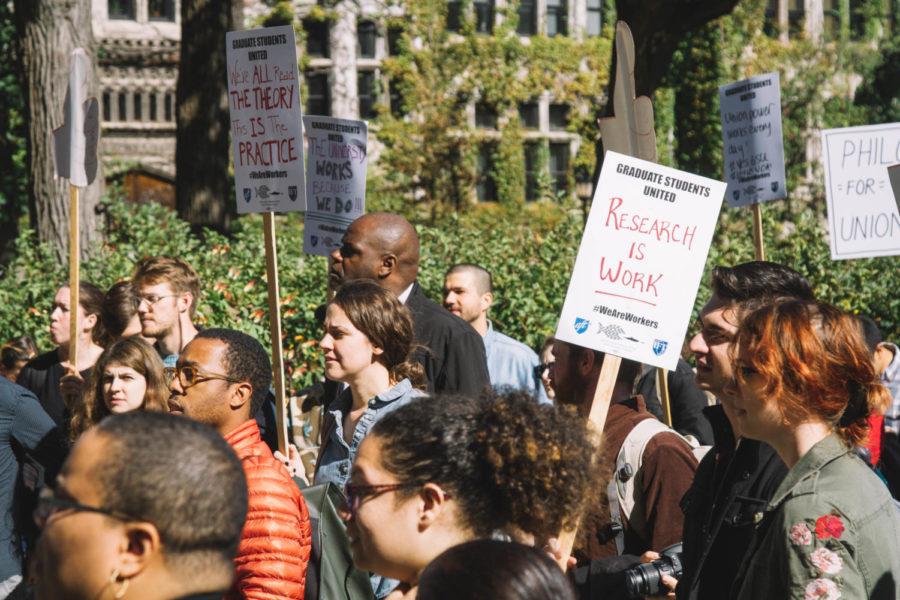

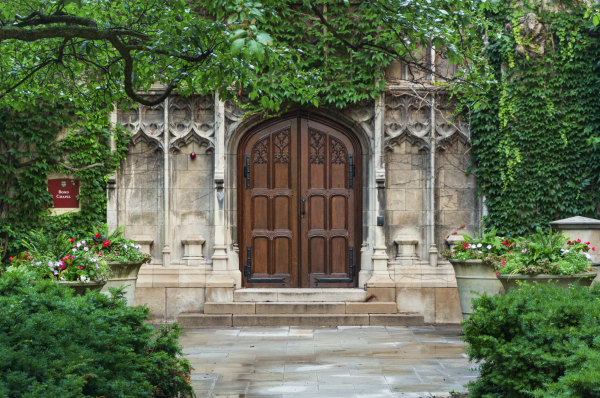
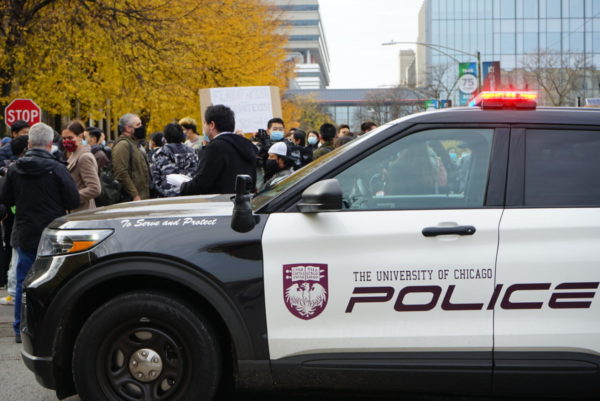
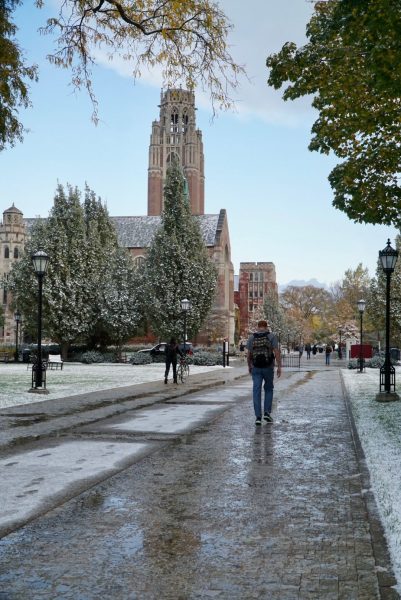
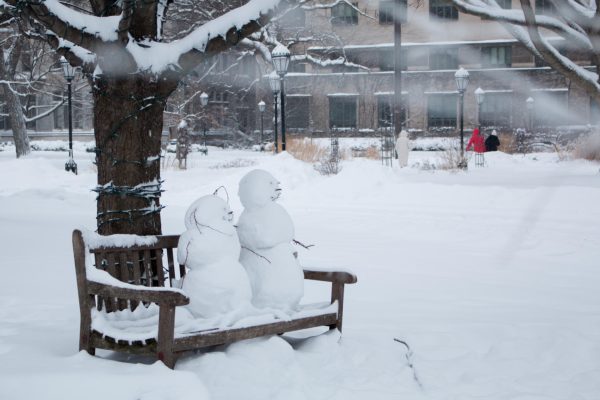

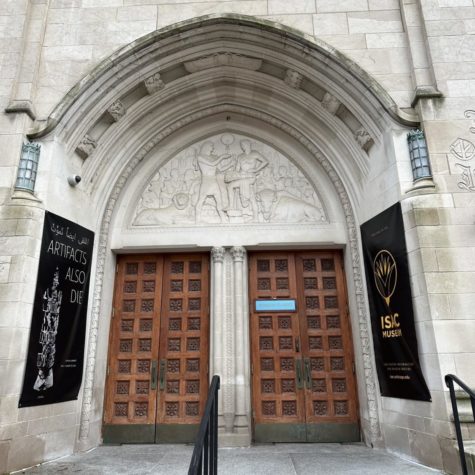
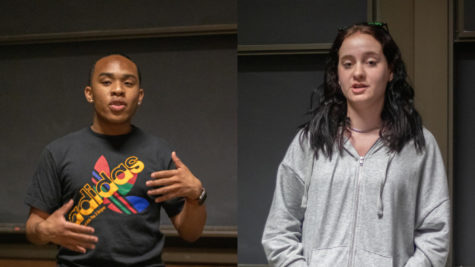
Matthew G. Andersson / Jan 23, 2023 at 9:29 am
This begs the question: why is the University so dependent on graduate student labor? The answer is partly to be found, ironically, among the faculty and their union, the AAUP, which facilitates collective bargaining. Faculty generally set work rules including teaching load, sabbaticals, paid leaves, and other routines that not only create cost and labor productivity distortions in university operations, but must be subsidized. The labor subsidy must by definition remain on a lower cost tier; hence resistance to cost escalation and work rule restrictions that would erode faculty subsidization, and encumber their low utilization rates, and their status. Faculty may welcome ideological solidarity with graduate students, but not in economic dimensions. Administration is a faculty institutional adjunct. Regards, ’96, Booth School of Business
precarious labor / Feb 17, 2023 at 11:31 am
The AAUP is not a union; it is a nonprofit membership association. Also, tenured and tenure-track faculty at U of C are not unionized.
Bob Michaelson / Jan 21, 2023 at 2:30 pm
The UChicago administration has generally treated the Kalven Report as a document to invoke or to ignore according to what is convenient for them. For example, in 2008, when Ann Marie Lipinski was appointed the university’s first Vice President for Civic Engagement, one of her specifically assigned tasks was to lobby for the City of Chicago to be awarded the 2016 Olympics (fortunately Chicago’s bid didn’t succeed). That was clearly in opposition to the Kalven Report’s requirement of neutrality; indeed, the Kalven Report specifically states that the university “is not a lobby.”
I’ve never understood why UChicago decided to lobby for the 2016 Olympics, but my guess is that it was quid pro quo for favors from Richie Daley.
Max Willner-Giwerc / Jan 19, 2023 at 10:13 am
Isn’t this just UChicago taking a stance on an internal issue rather than a larger social or political one? I think the Kalven Report might call this “act[ing] as an institution in its corporate capacity.” I could definitely be wrong about this, and I’m curious to hear the Editorial Board’s thoughts (or what others have to say). Thanks for writing such an interesting piece.
UChicago Student / Jan 19, 2023 at 6:13 pm
I’m inclined to agree; regardless of whether the University came out against or in support of the union, to do so would be to “take collective action…at the price of censuring any minority.” In fact, given that supporting GSU-UE appears to be a majority opinion among students, officially endorsing it might have a more chilling effect on speech than opposing it would.
Chris / Jan 20, 2023 at 11:58 am
Speaking here as a member of GSU-UE:
Nobody is suggesting the administration should have endorsed GSU-UE. Certainly it would have been reasonable to recognize the union voluntarily based the cards collected. But we assumed they would not, and we actually voted in August at a mass membership meeting to request neutrality from the administration during the election period. This is also the stance we’ve requested from faculty.
To Max’s original point, he raises an interesting objection. I think it’s best to quote the full context,
“From time to time instances will arise in which the society, or segments of it, threaten the very mission of the university and its values of free inquiry. In such a crisis, it becomes the obligation of the university as an institution to oppose such measures and actively to defend its interests and its values. There is another context in which questions as to the appropriate role of the university may possibly arise, situations involving university ownership of property, its receipt of funds, its awarding of honors, its membership in other organizations. Here, of necessity, the university, however it acts, must act as an institution in its corporate capacity. In the exceptional instance, these corporate activities of the university may appear so incompatible with paramount social values as to require careful assessment of the consequences.
These extraordinary instances apart, there emerges, as we see it, a heavy presumption against the university taking collective action or expressing opinions on the political and social issues of the day, or modifying its corporate activities to foster social or political values, however compelling and appealing they may be.”
In my reading of this, the Kalven Report is expressing that the University may act in a ‘biased’ way in two specific circumstances:
1) Society or a segment of society is threatening the University’s mission. An example meeting this criteria in my memory, was when the University spoke against the Muslim ban early in the Trump administration. This was justified because it restricted immigration and travel for many of the University’s students and scholars.
2) The University must at times act as a corporation. If the University takes action as a corporation which is so in conflict with “paramount social values,” the University should tread carefully because of potential consequence.
Except in these two cases, the University should not weigh in or take action on political and social issues.
The question is not, “can the University act as a corporation.” The question is “which act of the University as a corporation is politically and socially neutral?” Here perhaps recognizing the union based on a majority of cards signed, or being 100% neutral during an election period, is the most neutral action available.
But here it’s easy to see no available course is truly neutral. Change is occurring inside the walls of the University, either you support it, allow it to happen, or try to stop it. The entire framework of the Kalven Report imagines political and social issues happen in a sphere totally separately from the University. But this is not the reality we live in. And more generally, we need to recognize that “neutrality” is a political stance taken in favor of the existing status quo.
And now returning to what GSU-UE is pushing for, point 5 of our platform is “Transparency & Democracy.” This University belongs to all of us, the students, the faculty, the staff, etc. And the operations of the University greatly materially impact the surrounding community, yet they are generally not considered. We are pushing for full transparency in the University’s internal finances and real democratic input in the decision making process. In truth, there’s nothing about the Kalven Report that makes it particularly legitimate. It’s a report put together by a faculty committee in the 60s, which the administration has adopted as policy. An equivalent report could be legitimate if it was produced via an inclusive democratic process.